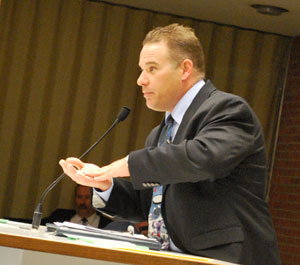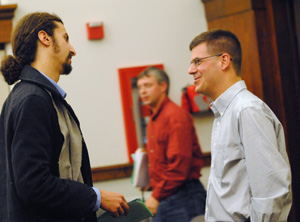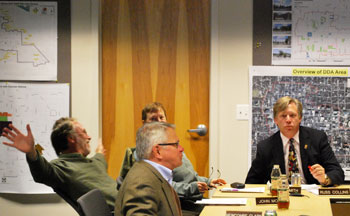Washtenaw County board of commissioners working session (Nov. 4, 2010): A presentation last week to the county board by sheriff Jerry Clayton represented more than 18 months of research, and aims to put to rest an issue that’s caused tension within the county for decades: What does it cost to put a sheriff’s deputy on patrol?

Left to right: Superior Township supervisor Bill McFarlane, Dexter Township supervisor Pat Kelly, and Manchester village president Pat Vailliencourt talk before the Nov. 4 working session of the Washtenaw County board of commissioners. They are all members of the county's police services steering committee, which recently made a recommendation related to the cost of delivering police services in the county. (Photos by the writer.)
During Thursday’s working session, Clayton told commissioners it’s important to agree on the cost of delivering police services, before moving on to the question of price – or what the county will charge for that service, presumably a lower amount. He also outlined several policy issues that the board needs to address, including what metrics they’ll use to determine future adjustments in cost and price.
Currently, there are 74 county deputies paid through contracts with local municipalities, including Ypsilanti Township, Ann Arbor Township and Superior Township, among others. The current price is $144,802 per police services unit (PSU) – a term that includes direct costs like salary and fringe benefits, as well as indirect costs and overhead. Current contracts call for a 4% increase next year, bringing the price to $150,594.
The police services steering committee (PSSC), appointed by the board of commissioners, has been studying the cost of delivering this service for well over a year. Its recommendation, delivered by Clayton to the board at Thursday’s working session, is to set the cost per PSU at $176,108. Setting the price will be an issue to tackle next, and is likely to be a more contentious one. Current contracts run through 2011, and negotiations will begin next year for 2012 and beyond.
The idea of agreeing on a cost should help address the price issue, Clayton said, and should help to assure contracting municipalities that the dramatic price escalations of recent years will stabilize. County officials have said those increases were necessary because the price of the contracts has been significantly lower than the true cost of delivering police services.
Several PSSC members attended Thursday’s session, including leaders of Manchester and the townships of Ann Arbor, Dexter and Superior. They spoke to commissioners, in some cases quite poignantly, about the value that these contract deputies provide to the county as a whole – a value that’s not just limited to the municipalities that pay for the deputies, they stressed. The argument is meant to persuade the board to offset the cost of those deputies by charging a lower price. In the past, some commissioners have argued that the county is subsidizing the patrols in a way that’s unfair to residents of cities like Ann Arbor, who also pay for their own police force.
Notably absent from the meeting were representatives from Ypsilanti Township, the largest unit that contracts for deputies and a member of the PSSC. A year ago, voters defeated a millage that would have paid for police services, and township officials cut the number of deputies it uses from 38 to 31. [See Chronicle coverage: "County Board OKs Ypsi Twp. Deputy Cuts"] On Nov. 2, however, township voters approved a police services millage, with support from 58% of voters. A similar millage proposal in Augusta Township was voted down the same day. Meanwhile, Ypsilanti Township has been in talks with the city of Ypsilanti about consolidating the two municipalities’ police services – Ypsilanti has its own police force.
Then there’s the lawsuit that the townships of Ypsilanti, Salem and Augusta filed against the county in 2006 over the issue of contract deputy prices – commissioner Jeff Irwin pointed out during Thursday’s meeting that the case is “still lingering.” A judge will be hearing a motion on that case this Wednesday, as the county tries to recoup more than $2 million from two of the three townships.
The board did not take action on Thursday. Comments from commissioners indicate mixed views on the proposed cost model, with some arguing that more indirect or overhead costs should be included. However, nearly all of them praised Clayton for his leadership on this issue, thanking him for bringing civility to the discussion. It’s an indirect commentary on the board’s rocky relationship with Clayton’s predecessor, Dan Minzey, who was aligned with Ypsilanti Township and was defeated by Clayton in 2008. [Full Story]










